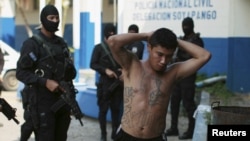Central America’s Northern Triangle countries are taking important steps in their long effort to rein in corruption and criminal enterprise, and to establish rule of law.
Guatemala, El Salvador and Honduras, the countries of the Northern Triangle, have for decades been plagued by high levels of violence, transnational crime, criminal gang activity, and corruption. As a result, the three countries have suffered years of social and economic stagnation, lack of economic opportunity for vast segments of society, and deep-seated issues of social and economic inequity.
And one of the greatest obstacles standing in the way of effective reform has always been impunity that allows criminals to continue operating beyond the reach of justice.
Working in partnership with the governments of El Salvador, Guatemala and Honduras, the United States is investing in the U.S. Strategy for Engagement in Central America, which seeks to improve prosperity, security, and governance across the Northern Triangle.
The U.S. is employing a three-pronged approach to reach the security goal, said Assistant Secretary for International Narcotics and Law Enforcement Affairs William Brownfield. First, we support local programs that impact people who live in affected communities.
Second, we help to reform institutions, offer training and capacity-building to create better performing law enforcement, criminal prosecution, courts, and corrections; and finally, we boost those organizations that provide law enforcement, management, control, and protection of ports and borders on a daily basis.
And we’ve seen some excellent results over the past 12 months, said Assistant Secretary Brownfield. In Guatemala, a wide array of government officials, including the President and Vice President, have been removed and arrested on allegations of corruption, thanks to a long investigation by the UN International Commission Against Impunity in Guatemala, commonly known by its Spanish acronym, CICIG.
In Honduras, a civil society-led commission is reviewing members of the national police, and has terminated a significant percentage of the highest-ranking officers it has reviewed to date.
More positively, over 50 new model police precincts in Guatemala, Honduras, and El Salvador will serve as the core for a community-based security strategy. Additionally, some 60,000 youths from all three countries have undergone a Gang Resistance Education and Training program, to help them resist recruitment by gangs.
The governments of El Salvador, Guatemala, and Honduras have embarked on a path of transformation that will improve their peoples’ economic opportunity, governance, and public safety. The United States is proud to aid them in their efforts.














